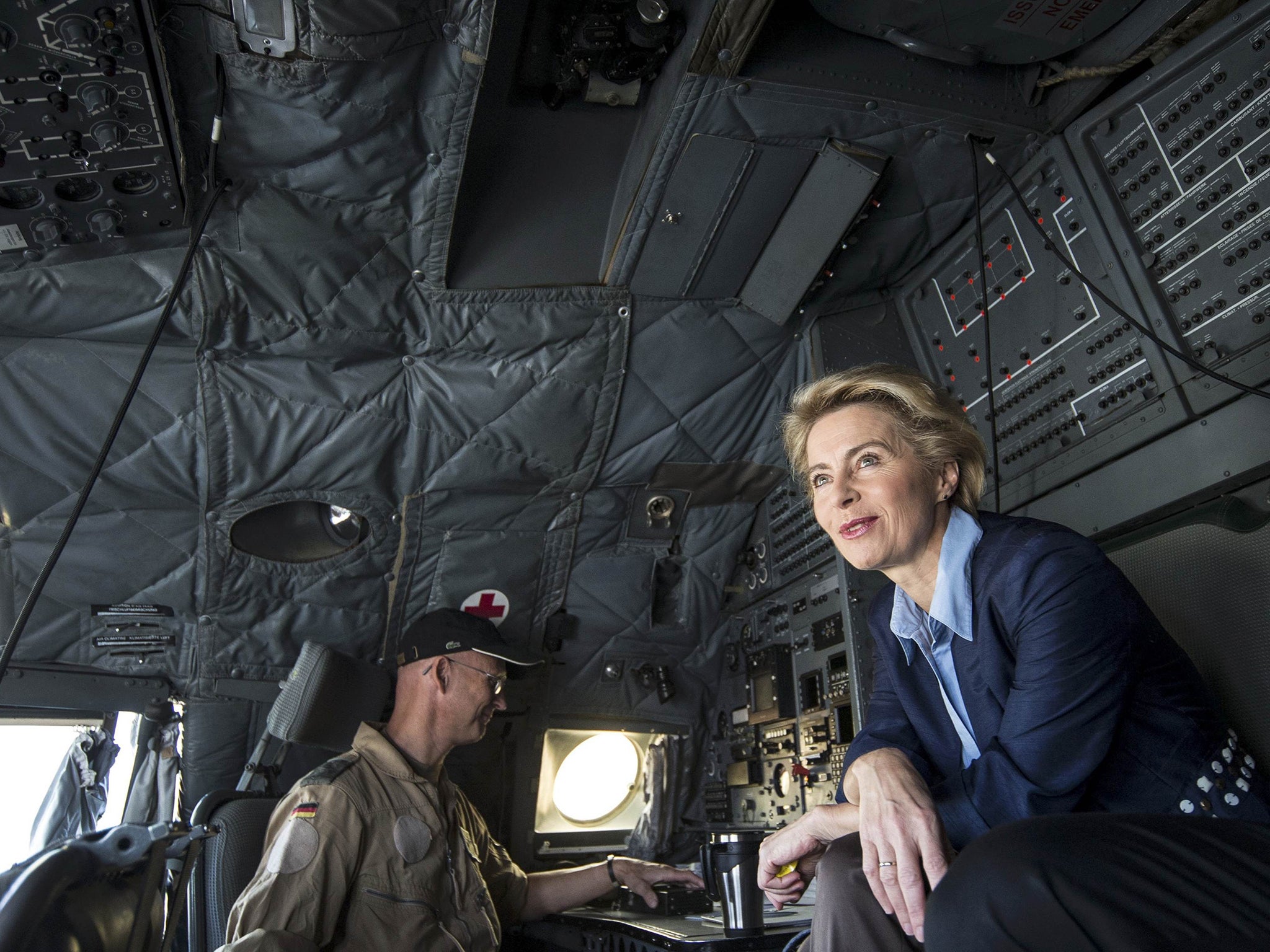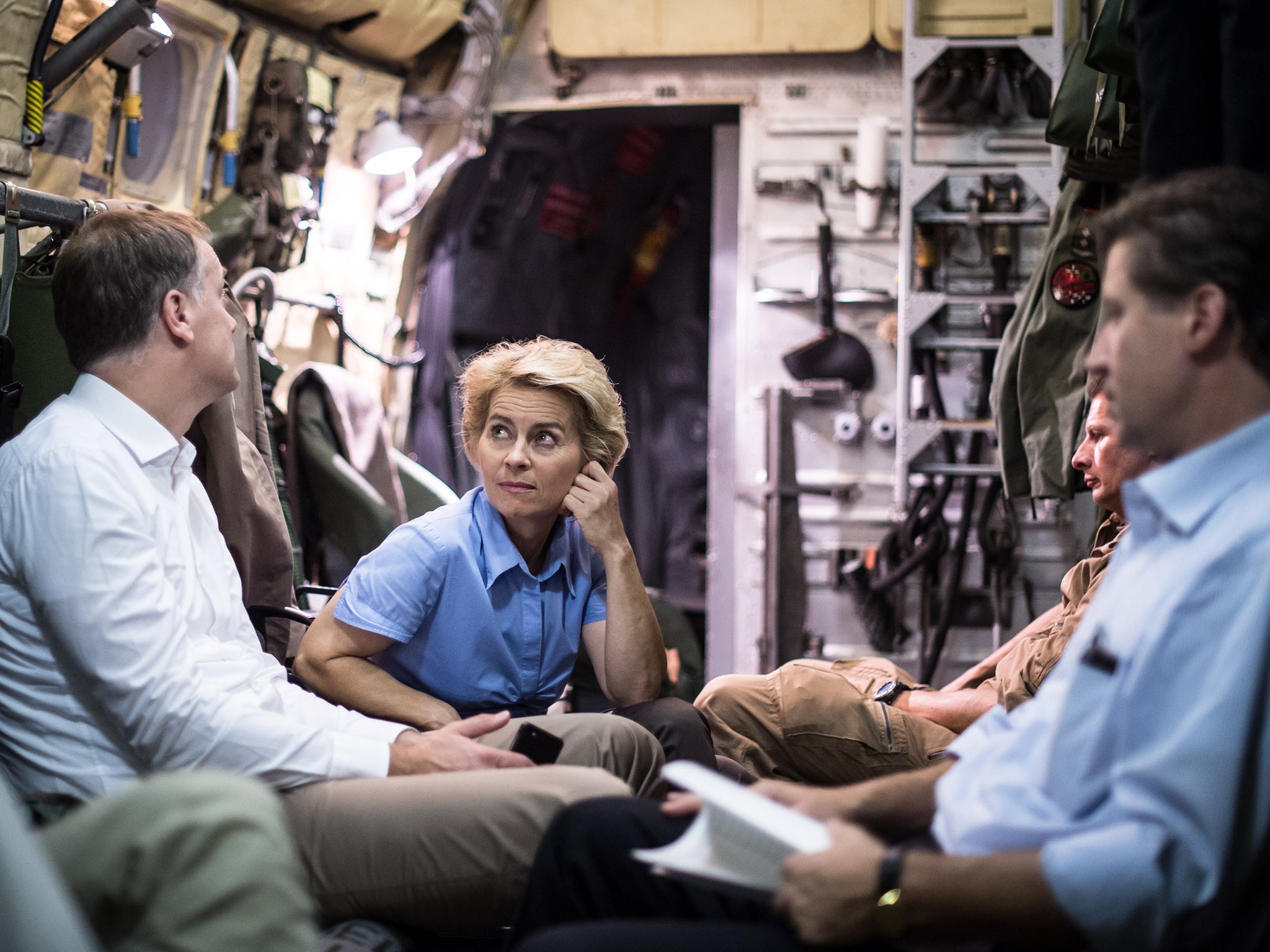Germany’s Defence Minister must sort out misfiring military hardware if she hope's to succeed Angela Merkel as Chancellor
Ursula von der Leyen is in the line of fire as the country struggles to meet Nato commitments or keep a promise to arm Iraqi Kurds against Isis

Ursula von der Leyen, whose ambition to succeed Angela Merkel is too transparent for German taste, is finding out the hard way why her job as Defence Minister is a most dangerous assignment – and nicknamed the “ejector seat”.
News that Germany’s military hardware is in such a state of disrepair that it is struggling to meet Nato commitments or keep a promise to arm Iraqi Kurds against Isis has put the minister in the line of fire.
Dubbed “the War Minister” for wanting to put military muscle behind Germany’s growing presence in geo-political affairs, Ms Von der Leyen is one of the only contenders to succeed Ms Merkel as conservative leader. But the defence equipment scandal is an unmitigated embarrassment for Germany which could put an end to such ambitions.
Many German tanks “are only held together by Ms Von der Leyen’s hairspray”, said one television show after the forces acknowledged that only 70 of their 180 Boxer armoured fighting vehicles, seven of 43 navy helicopters, 42 of 109 air force Eurofighters and 38 of 89 Tornado fighters were operational. The list goes on.

As well as casting doubt on commitments on air defence for Nato allies in the Baltic states if the Ukraine crisis escalates, it coincides with a spate of breakdowns of military planes taking weapons to Iraq and aid to African states hit by Ebola.
“What it comes down to is that you promise your allies you will do certain things if an ally is attacked but in the end it turns out that you are not capable of doing what you promised,” said Christian Tuschhoff, a foreign policy expert at Berlin’s Free University. “So it’s serious and it’s very embarrassing.”
The hawks are complaining that, while Germany’s planes cannot even get off the ground, smaller allies like Belgium and Denmark are joining the air strikes against Isis. The doves say Germany is clearly not cut out for action and should bring the troops home from foreign missions.
The 55-year-old Defence Minister, whose talent for self-promotion is matched by her toughness, is taking the criticism on the chin, acknowledging that fixing the armed forces’ military equipment problems will take years.
She has defended the Bundeswehr’s reputation, saying that it “demonstrates its capabilities in 17 overseas missions around the world daily”.
Former military chief Harald Kujat said the problem has been caused by years of cost cutting and the need to fulfil more foreign missions.
Ms Von der Leyen’s critics accuse her of being distracted by gimmicks to make the military a more attractive career. She would be “well-advised to do fewer photo calls and more work”, said Thorsten Schaefer-Guembel, deputy chairman of the Social Democrats (SPD), Ms Merkel’s coalition partners.

But Constanze Stelzenmüller, senior fellow at the German Marshall Fund, a think-tank, said it was “ludicrous” to blame Ms Von der Leyen when she has only been in the job since December. Ms Stelzenmüller is calling for “national consensus from the top down and a Chancellor who says ‘we have now raised the defence budget’”.
But the government, especially Finance Minister Wolfgang Schäuble, argues it is not a money problem, as nearly half a billion euros of the military budget was unused last year. With no chance of more cash to modernise hardware, the minister has limited options, though she does have Ms Merkel’s “full support”.
When Ms Von der Leyen got the job, a senior member of the Christian Democratic Union (CDU) said privately it was a “gift” that would make or break her leadership aspirations. The post has a poor survival rate: there have been eight chancellors since 1949 but 17 defence ministers, only one of whom – Helmut Schmidt – went on to become Chancellor.
Ms Von der Leyen’s predecessor, Thomas de Maizière, fell foul of cost overruns for drones. His predecessor, Karl-Theodor zu Guttenberg, quit in a plagiarism scandal. Before him, Franz Josef Jung quit over civilian deaths in Afghanistan. The best-known resignation was in the 1962 “Spiegel Affair” when Franz Josef Strauss accused the magazine of treason.
But Ms Von der Leyen has a history of standing her ground. In her previous post as Labour Minister she defied Ms Merkel by backing an opposition bill for boardroom quotas for women. As Family Minister she fought for more childcare facilities for working women.
In the staid world of German politics, where ambition is best nurtured in private, Ms Von der Leyen is not wildly popular. A doctor and mother of seven, she is admired and envied in equal measure.
Ms Stelzenmüller said the crisis could help Ms Von der Leyen “if she handles it shrewdly”. “But the post of defence minister is always an extremely dangerous one,” the Berlin professor said.
Reuters
Join our commenting forum
Join thought-provoking conversations, follow other Independent readers and see their replies
Comments
Bookmark popover
Removed from bookmarks